
The SHARPP Center for Interpersonal Violence Awareness, Prevention, and Advocacy has existed on UNH Durham’s campus for over 35 years, and with the hiring of The SHARPP Center’s Expanded Services Coordinator, Caroline Young, in November 2022, The SHARPP Center is now an available resource for the UNH Law community. Read below to learn more about SHARPP’s services, prevention programming, and outreach initiatives specific to the UNH Law community.
The SHARPP Center is a free and confidential resource for UNH faculty, staff, and students who have been impacted by interpersonal violence (sexual assault, relationship abuse, stalking, and sexual harassment), regardless of whether that experience happened during their time at UNH or not. Our services are available to individuals who have directly experienced interpersonal violence as well as the family, friends, and loved ones who are supporting them. The SHARPP Center strives to provide culturally responsive services to individuals of all identities and does not discriminate based on gender identity/expression, sexual orientation, race, ethnicity, religion, ability status, or age. We know that interpersonal violence can impact people differently based on identity and strive to operate from intersectional, power-conscious, and empowerment-based frameworks to ensure that our services are holistically supporting individuals wherever they are. Find more general information about our services, who The SHARPP Center serves, and how The SHARPP Center can help here; and look below to learn more about The SHARPP Center’s advocacy services specifically for the UNH Law community.

Emotional Support
Emotional Support
SHARPP Center advocates are available to provide you with a non-judgmental space to discuss the ways you have been impacted and to explore your needs.
Advocates are not trained mental health providers, and the emotional support provided by SHARPP Center advocates is not the same as therapy. However, our advocates have specialized training in the dynamics of violence, the impacts this may have on individuals, and ways that brains and bodies are impacted by stress and trauma. Caroline Young, Expanded Services Coordinator, is the person who members of the UNH Law community would most likely be meeting with, unless they call the SHARPP Center's helpline during evenings or weekends. SHARPP Center advocates are available to provide you with a non-judgmental space to discuss the ways you have been impacted by an experience of harm, to explore your needs, and identify some initial ways to cope with the ways it is currently causing distress for you. There may be times after experiencing harm when things feel overwhelming or unmanageable. This can happen in the time immediately following harm, or days, weeks, and years later. SHARPP Center advocates can provide support during these times to help you regain a sense of control by identifying emotions, needs, and supporting your coping skills. If you are seeking additional mental health support, SHARPP Center advocates can help identify and refer you to campus and community providers.

Information Sharing
Information Sharing
Advocates can use their training to share information with you to help you understand dynamics of violence/harm, systems, on and off-campus resources, and more.
Advocates can use their training to share information with you to help you understand dynamics of violence/harm, systems, on and off-campus resources, and more. We hope to provide you with relevant information to help you feel less alone and to ensure you know what options are available to support you in making the best decisions for you. Advocates can help identify options and help you explore which choices best meet your specific needs in a non-judgmental way. Each individual is encouraged to make decisions about what is best for them, and no one who contacts the SHARPP Center is required to take any options provided by the advocate.
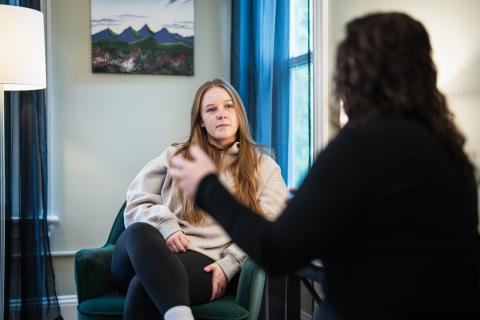
Safety Planning
Safety Planning
Advocates can help you explore how your experience of harm has impacted your sense of safety and what strategies you may wish to take to contribute to a greater sense of safety.
Safety is a deeply personal feeling that is shaped by our identities and experiences. Safety can include a sense of security, agency and autonomy, a sense of trust in yourself, your abilities, the people around you, and the environment you’re in. Experiencing interpersonal violence can impact your sense of safety in many different ways and each person is impacted differently. SHARPP Center advocates are available to help you think about your sense of safety in different aspects of your life, including emotionally, digitally/technologically, physically, and financially. Advocates can help you explore how your experience of harm has impacted your sense of safety in these areas, and what strategies you may wish to take to contribute to a greater sense of safety. There is no one way to increase safety, and advocates are here to support you in making the choices that are right for you and your experience.
Additional Safety Planning Resources:
- SPARC (Stalking Prevention, Awareness, and Resource Center) Stalking Safety Strategies
- Safety Planning around Technology
- SPARC Documentation Logs
- Stalking and Harassment Self-Assessment Tool
- Interactive Safety Planning Tool
- Safety & Prevention as a Bystander
If you would like to explore these options, discuss your self-assessment results, or review any safety planning questions with an advocate from the SHARPP Center, book a confidential appointment with Caroline Young, Expanded Services Coordinator.

Academic Support
Academic Support
The SHARPP Center can help you explore numerous resources and options available to you to help address the impact of harm on your academics.
Experiencing interpersonal violence can impact many aspects of our lives, including our academic success. You may find that it is harder to concentrate during class, while doing homework or studying for a test, that you are not sleeping as well, or are having a hard time getting to class or turning work in on time. There are numerous resources and options available to you to help address the impact of harm on your academics. The SHARPP Center advocates can help you explore both short and long-term options and pursue any that feel appropriate for you.

Resources & Referrals
Resources & Referrals
Advocates can provide you with personalized referrals to resources you may not already be aware of or can help facilitate a referral to resources if you are uncertain of how to contact them.
Each individual’s experience of harm and needs afterwards will be different. SHARPP Center advocates can provide support, resources, and information to address many concerns that you may have, however we often cannot address or meet every need that may arise. Our advocates are knowledgeable about other resources and offices on campus and in your local community to help support your needs and goals. Advocates can provide you with personalized referrals to resources you may not already be aware of or can help facilitate a referral to resources if you are uncertain of how to contact them. This includes Thrive Survivor Support Center, (Merrimack County) or other crisis centers and resources that are local to where survivors live, work, etc.
To find other resources in your state or area:
- NHCADSV (New Hampshire Coalition Against Domestic and Sexual Violence) - to find your NH county's crisis center
- SPARC (Stalking Prevention, Awareness, & Resource Center)
- National Domestic Violence Hotline
- NSVRC (National Sexual Violence Resource Center)
- RAINN (Rape, Abuse & Incest National Network)
- Use this tool to find your local crisis center outside of NH

System Navigation & Accompaniment
System Navigation & Accompaniment
SHARPP Center advocates are trained to support you if you choose to engage with a formal system like the university.
You may choose to engage with a formal system like the university. We know that this system can be complicated and overwhelming, especially if it is unfamiliar to you! Our advocates are trained in the protocols used within this system. They can help you know what to expect as you interact with it, as well as facilitate connections with other professionals to help meet your needs.
While accompanying you, advocates are not there to speak on your behalf. We are there to help ensure your voice is heard and your needs are communicated. Often that looks like the advocate sitting in silence while you interact with the other professional, however the advocate may also check in and see how you’re doing, ask if you need to take a break, or make sure you know what is happening and why.
UNH Administrative Processes: If you were harmed by another UNH community member, we can help you understand your options through the University and support you if you decide to pursue any of them. This often includes connecting you with the Civil Rights and Equity Office to request supportive measures or to pursue a formal university process. SHARPP Center advocates can provide information about what these processes may look like and can accompany you to meetings, interviews, and hearings.
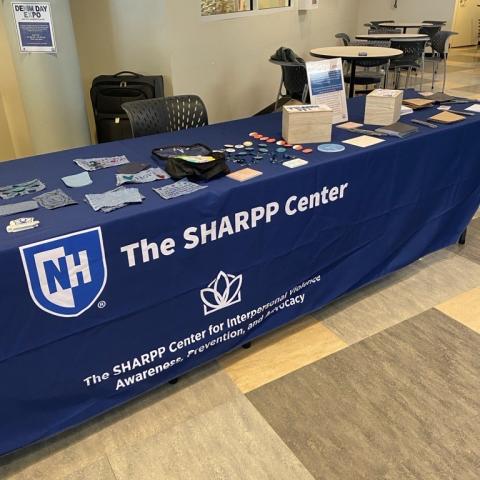
Outreach
Outreach
Outreach is the work that we do to ensure all UNH Law community members know who the SHARPP Center is and what our services are. Want to get to know the SHARPP Center's Expanded Services Coordinator, Caroline Young? Want to invite Caroline to your next student org meeting or class for a 20-30 minute presentation on The SHARPP Center's services at Law? Email Caroline to grab a coffee/tea with Caroline or book a "SHARPP at Law" presentation (in-person or virtual)!
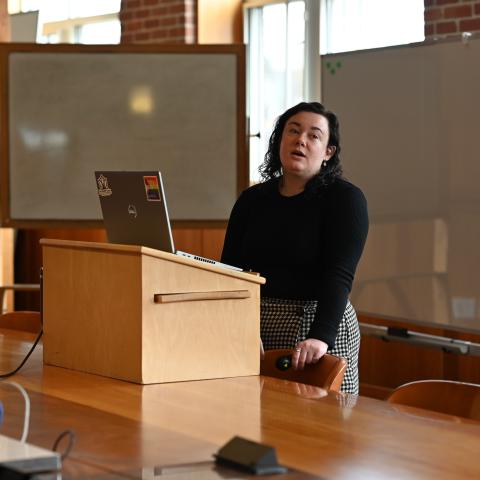
Prevention Programming
Prevention Programming
In addition to the SHARPP Center's advocacy services and outreach, the SHARPP Center is now offering prevention programming for UNH Law. Read more about the SHARPP Center's vision for a UNH free from violence and the importance of prevention programming here. To request one of the Law-customized programs created by our Expanded Services Coordinator, Caroline Young, or one of our other programs for your student organization, classroom, or department please fill out our Program Request Form by clicking the button below.
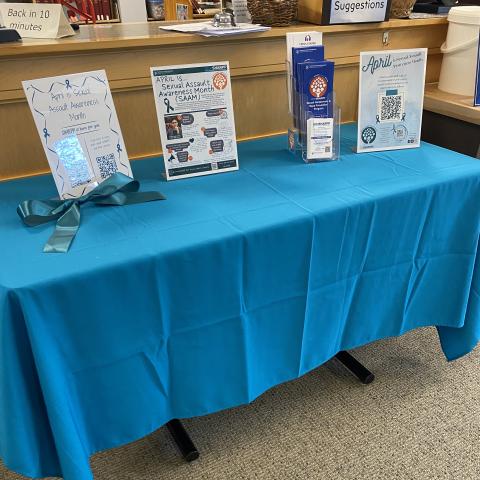
Awareness Campaigns
Awareness Campaigns
The SHARPP Center honors three awareness months each academic year that help increase community knowledge and connection to our work.
Relationship Abuse Awareness Month/Domestic Violence Awareness Month (October)
National Stalking Awareness Month (January)
Sexual Assault Awareness Month (April)
Learn more about the history of these awareness initiatives!
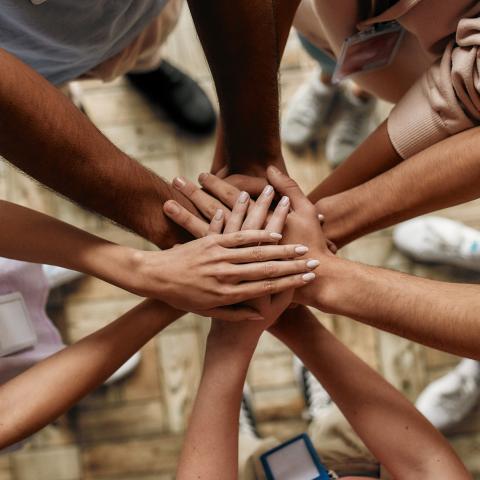
Volunteer Information
Volunteer Information
At this point in time, there are a few ways to get involved with The SHARPP Center on the UNH Law campus if you are interested in the work that we do.
Students can:
- Help The SHARPP Center with tabling (set up, activity, break down)
- Ask your professors to request a program for your class
Reach out to Caroline Young, Expanded Services Coordinator, if interested in learning more.

CONTACT
To meet with Caroline:
Drop in hours @ Law: Thursdays 9AM-4PM in RM 313
Book a confidential meeting
Book a prevention program
Caroline.Young1@unh.edu